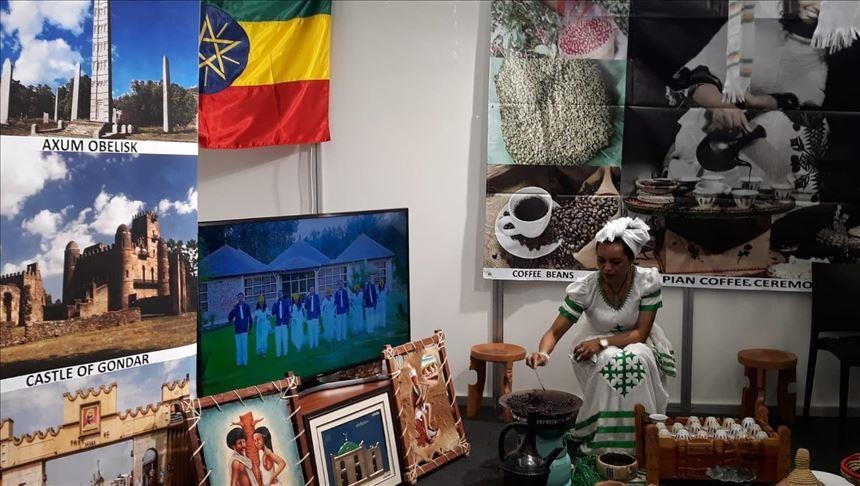 file photo
file photo
ADDIS ABABA, Ethiopia
The COVID-19 pandemic has significantly impacted the growth and income of Ethiopia's Meetings, Incentives, Conferences, and Exhibitions (MICE) business, industry sources said.
The strategy document of the Ethiopian Convention Bureau (ECB), which was established in 2021 as a specialized wing of the ministry level Tourism Ethiopia and tasked to lead the growth of the country's MICE industry, underlines that Ethiopia has significant potential and experience in attracting and organizing regional, continental, global meetings, conferences, and exhibitions.
Wondmagegn Girma, marketing head of ECB, told Anadolu Agency that Ethiopia, which hosts the African Union (AU), 115 embassies, several global development agencies, and NGOs have a vast potential to be the hub of the MICE industry.
"For more than half a century, Ethiopia has been hosting high profile ordinary and extraordinary annual and bi-annual summits of the head of state and governments, ministers and experts meetings of the Organization of African Union which is now the African Union(AU)," Girma noted.
He added that United Nations Economic Commission for Africa (ECA) which has been operating in the capital Addis Ababa since 1958, has a fully developed meetings and exhibitions venue, The United Nations Conference Center in Addis Ababa (UNCC-AA).
It has been providing "high standard regional and global conference and exhibition services for decades."
Nascent industry
Nebiyu Lema, owner and managing director of Prana Events, one of the local private companies organizing local and regional conferences and exhibitions, told Anadolu Agency that the MICE industry had been an exclusive business of government continental or global organizations for decades.
"However, over the past couple of decades, the industry has expanded to the private sectors," Lema said. "Consequently, event organizing and service providing private companies have been mushrooming and jobs have also been created."
Despite the potential and industry experience, Lema noted, Ethiopia does not have enough high-quality convention centers and hotels.
"The overall level of hospitality is way below the expectations," he noted, adding that lack of industry networking, promotion, and national vision had also hampered the growth of the industry.
Girma agrees: "Until 2021, Ethiopia had not had a strategy and institution leading the industry and this is one of the reasons that affected the growth of MICE as an industry."
Devastating effects
According to the United Nations Conference on Trade and Development (UNCTAD), the latest COVID-19 and tourism update, the pandemic had "devastating effects on developing countries, especially those dependent on tourism," due to the public protection measures that resulted in" lockdowns, quarantines, and major restrictions on national and international mobility."
"The number of international tourist arrivals declined by 74% in 2020 compared with the previous year (UNWTO Tourism Dashboard). In many developing countries, arrivals were down by 80-90%," it stated, adding that the situation had resulted in "severe economic consequences."
Ali Todaro, Chief of Publications and Conference Management Section at the United Nations Conference Center of Economic Commission for Africa (UNCC-AA), told Anadolu Agency that the constriction imposed on national, regional, and international mobility and the preventive measures that were put in place and barred in-person meetings had an immediate effect on the conference center.
"UNCC-AA took immediate measures to help prevent the spread of the virus. Accordingly, one of the actions taken was the closure of the conference center for in-person meetings/conferences/events since mid-March 2020. Few in-person conferences/events were held," he said.
He added: "… most of the events held since mid-March 2020 have been virtually followed by a few hybrid and in-person sessions."
Consequently, he said, COVID-19 had affected the income of the center.
"…the Centre lost a substantial amount of cost-recovery income as a result of not hosting in-person events…," he revealed without specifying the amount.
However, the pandemic was also an opportunity that led the Centre to "upgrade its IT infrastructure," Todaro Noted.
Job and income loss
According to Lema and Girma, the pandemic had significantly impacted Ethiopia's nascent MICE industry's ambition, growth, and income.
Ethiopia lacks segregated data regarding the annual income generated by conference tourism. Still, the Ethiopian Event and Exhibition Organizers Association estimates conference tourism accounts for 35 to 45 percent of the total tourism income of the country.
According to the Ethiopian Ministry of Culture, Ethiopia earned $ 2 billion in 2019 and the pandemic had slashed the income by two-thirds.
Citing a study commissioned by the Addis Ababa Chamber of Commerce and Sectoral Association on the impact of COVID 19 on the MICE industry, Girma said the findings of the research that was released last June had indicated the crippling effects of a pandemic on the industry.
"According to the findings, due to travel and gathering restrictions, many events were canceled, and millions in revenue were lost that led to more than 50 percent decrease in revenue compared to pre-COVID 19," he noted.
"From what we know," Lema said, "The pandemic had forced many private companies to close and some had effectively downsized."
According to Girma, in the coming five years, Ethiopia will build state-of-the-art conference centers, improve the quality of the hospitality service, and assist private companies in building their capabilities.
"By improving the sector, we aspire to earn $ 250 million in ten years," he noted.
However, the impact would be a long-term one, Girma added.
According to the Ethiopian Ministry of Culture, Ethiopia earned $2 billion in 2019 and the pandemic had slashed the income by two-thirds.
Anadolu Agency website contains only a portion of the news stories offered to subscribers in the AA News Broadcasting System (HAS), and in summarized form. Please contact us for subscription options.




